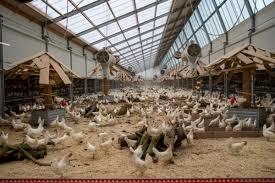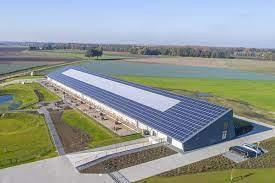 In a December 1st announcement, the Kroger Company revealed a strategic alliance with Kipster Farms of the Netherlands to advance egg production applying low carbon emission technology. Kroger Company will source eggs from MPS Egg Farms of Indiana and comply with sustainable, zero-waste and low emission standards. MPS Egg Farms is currently erecting facilities to supply Kroger with eggs to be marketed under the Simple Truth™ house brand. It is anticipated that Simple Truth™ based on Kipster production practices will be marketed in late 2022.
In a December 1st announcement, the Kroger Company revealed a strategic alliance with Kipster Farms of the Netherlands to advance egg production applying low carbon emission technology. Kroger Company will source eggs from MPS Egg Farms of Indiana and comply with sustainable, zero-waste and low emission standards. MPS Egg Farms is currently erecting facilities to supply Kroger with eggs to be marketed under the Simple Truth™ house brand. It is anticipated that Simple Truth™ based on Kipster production practices will be marketed in late 2022.
According to the company website, the Kipster Farms house allows the flock access to a sun porch and to outside range with natural cover. Layer feed incorporates bakery waste, that subject to availability, is common in the U.S. The Kipster farm in the Netherlands incorporates generation of solar power and processing of manure, again practices that are gaining acceptance by U.S. egg producers.
 It is seriously questioned whether the Kipster system does in fact represent a reduction in carbon emissions or is simply ‘window dressing’ to support Kroger environmental claims as noted in the most recent Quarterly Report. Clearly some of the innovations incorporated into the Kipster program will be adopted by the U.S. egg industry with both solar power and recycling as technically and financially beneficial.
It is seriously questioned whether the Kipster system does in fact represent a reduction in carbon emissions or is simply ‘window dressing’ to support Kroger environmental claims as noted in the most recent Quarterly Report. Clearly some of the innovations incorporated into the Kipster program will be adopted by the U.S. egg industry with both solar power and recycling as technically and financially beneficial.
The Kroger-Kipster association raises a question of who will pay for the additional costs that may or may not benefit the environment but obviously add to the image of the retailer. It is noted that the single Kipster house in the Netherlands was erected following a supply agreement with the Albert Hein chain of supermarkets owned by Ahold-Delhaize. It would be unfortunate if a “sustainability race” were to evolve with producers bearing the cost and retailers benefiting from enhanced image and higher margins.